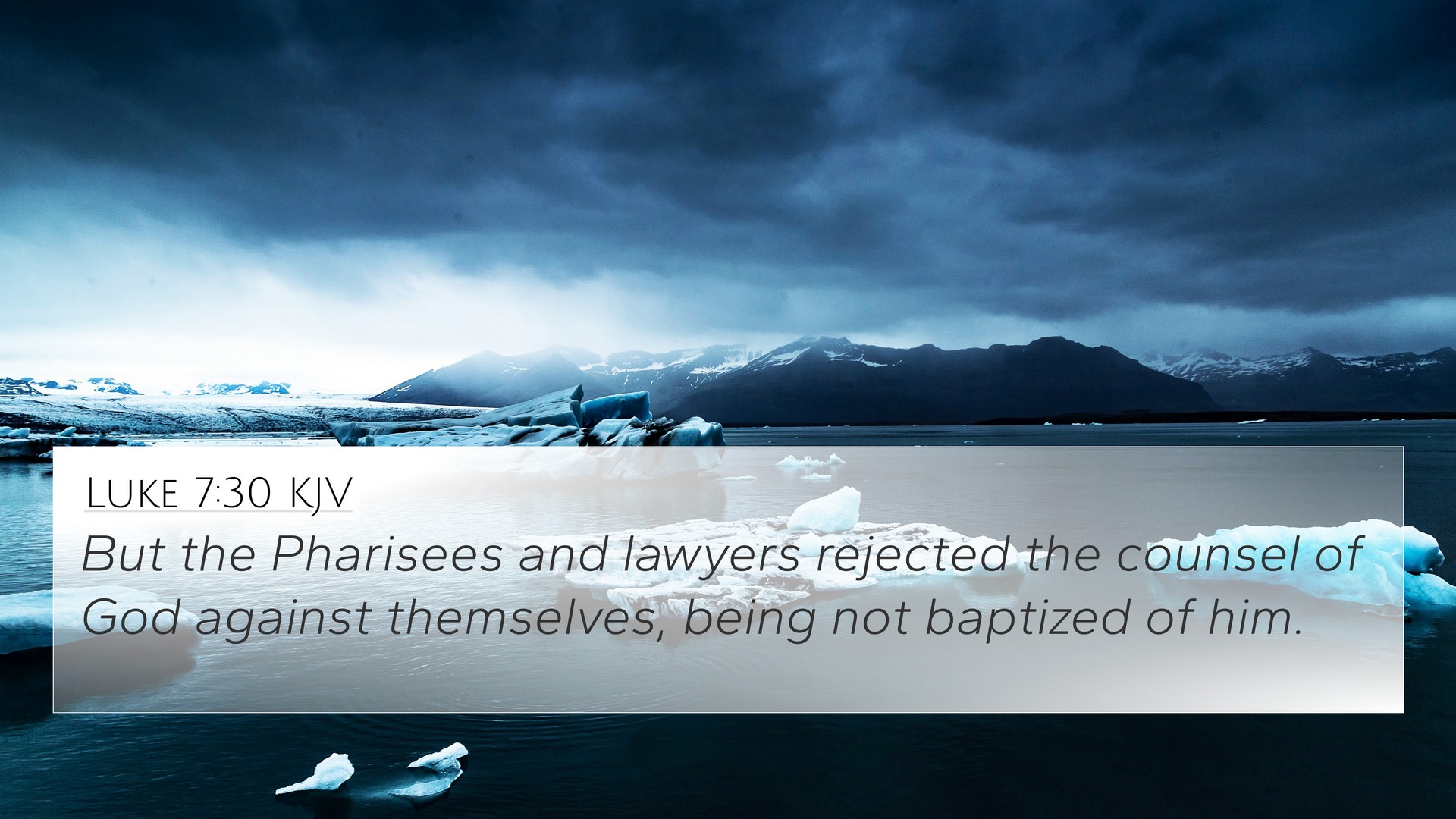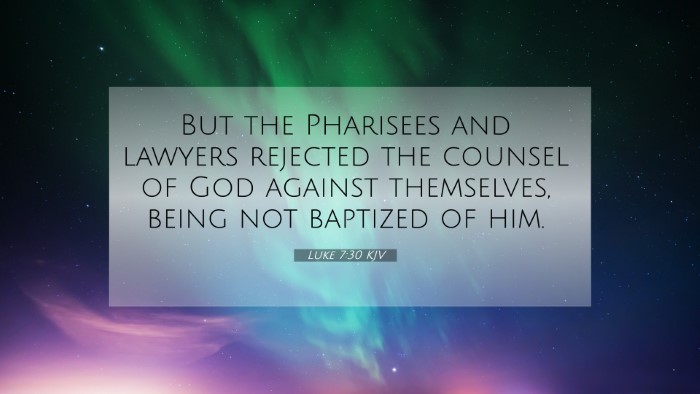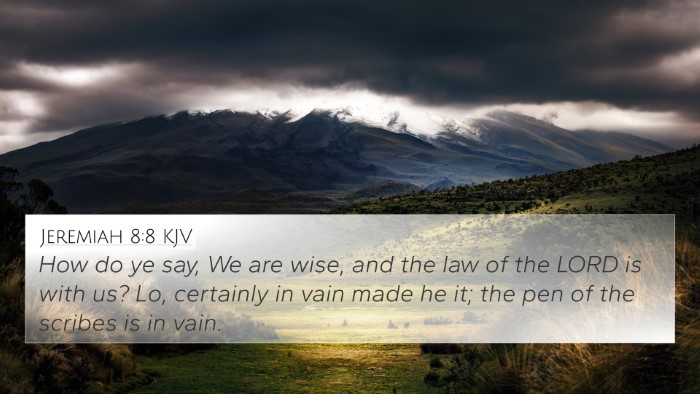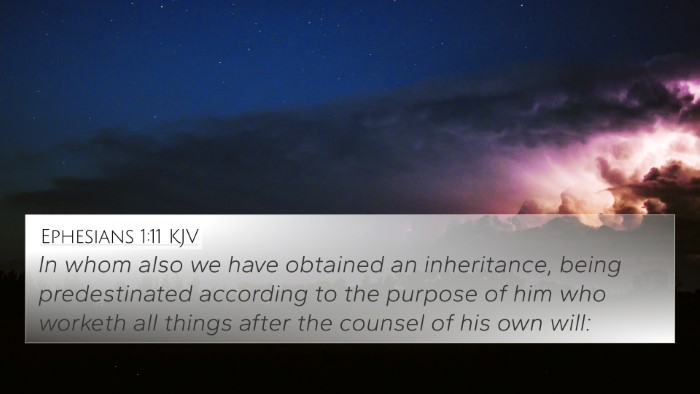Luke 7:30 - Verse Explanation
Luke 7:30 states, "But the Pharisees and lawyers rejected the will of God for themselves, not having been baptized by him." This verse highlights the critical response of religious leaders to the ministry of John the Baptist and, by extension, to God's plans for salvation.
Meaning and Interpretation
-
Rejection of God’s Will: The Pharisees and lawyers, symbols of established religious authority, rejected divine guidance, suggesting that even those considered pious can miss God's intentions. This signifies a theme of spiritual blindness prevalent in the Gospels.
-
Baptism as a Symbol: The baptism by John served not only as a ritual of repentance but also as a means of acknowledging God’s impending Kingdom. Their refusal reflects a deliberate choice to remain outside God’s will.
-
Contrast with Followers: Unlike the religious leaders, those who accepted John’s baptism exemplify humility and willingness to align with God's will, fostering an inclusive understanding of faith that welcomes all who believe.
Commentary Insights
Matthew Henry’s Commentary: Matthew Henry emphasizes the pride of the Pharisees, who believed they could maintain their status without humility before God. Their rejection of baptism reflects a broader rejection of God's authority.
Albert Barnes’ Notes: Barnes explains that this rejection was not merely of a ritual but of the very will of God. He notes that by refusing to be baptized, the Pharisees denied their need for repentance and indicated their trust in their legalistic righteousness.
Adam Clarke's Commentary: Clarke elaborates on the nature of the law and grace, deducing that the Pharisees' refusal to repent stunted their spiritual growth. He warns that those firmly entrenched in tradition may overlook God's transformative actions.
Related Scripture References
- Matthew 3:7-9: John the Baptist addresses the Pharisees and Sadducees, challenging their reliance on heritage over repentance.
- John 1:11: "He came to His own, and His own did not receive Him," reflecting a broader theme of rejection often faced by Christ and His forerunner.
- Matthew 21:32: Jesus says that tax collectors and harlots enter the kingdom before the religious leaders, emphasizing God’s grace extension toward the humble.
- Luke 5:31-32: "I have not come to call the righteous, but sinners to repentance," reinforcing the need for acknowledgment of one's sinfulness.
- Acts 13:46: The rejection of the Gospel by the Jews highlights a continued pattern of unbelief in the face of God’s revelation.
- Hebrews 6:4-6: Warning against falling away after experiencing God's grace, this passage relates to the consequences of rejecting God's will.
- Isaiah 1:11-13: God denounces useless ceremonial acts disconnected from sincere repentance, mirroring the situation in Luke 7:30.
Thematic Connections and Cross-Referencing
The juxtaposition of John the Baptist’s ministry against the resistance of the Pharisees is crucial in understanding the overarching narrative of redemption. This verse serves as a pivotal point for thematic studies on the nature of repentance, spiritual authority, and the accessibility of God's grace:
-
Linking the Old and New Testament: The rejection faced by John and Jesus mirrors the prophets of old, emphasizing a repeated theme throughout scripture regarding the resistance to God’s messengers.
-
Comparative Analysis of Gospels: Similar accounts in Matthew and Mark portray the same resistance to prophetic messages, allowing for a detailed examination of differing perspectives, which may enhance understanding of Jesus’ mission.
-
Inter-Biblical Dialogue: Connections with Old Testament prophecies bring to light the continuity in God's plan for humanity's redemption, providing a rich background for interpreting New Testament writings.
Tools for Further Study
To deepen your understanding of Luke 7:30 and enhance your study of Bible verses, consider the following tools:
- Bible Concordance: Use this to find specific terms related to rejection and baptism to explore further.
- Cross-Reference Bible Study: This practice fosters an engagement with multiple scriptures to unveil profound connections.
- Bible Reference Resources: Materials such as commentaries and lexicons can provide insights into historical and cultural contexts.
- Comparative Bible Verse Analysis: Analyzing similar scenarios across different texts aids in identifying patterns of belief and disbelief.
- Comprehensive Bible Cross-Reference Materials: These can facilitate an exhaustive study of theological themes and ethical teachings.
Conclusion
The lesson from Luke 7:30 is profound: it warns of the danger of dismissing God's will through pride or preconceived notions. The invitation toward repentance and humility remains resilient across Biblical texts, extending a continual call for believers to align themselves with God's divine purposes. Through inter-Biblical dialogue and thematic connections, we can gather a rich tapestry of insights that help deepen our faith and understanding of God's kingdom.










